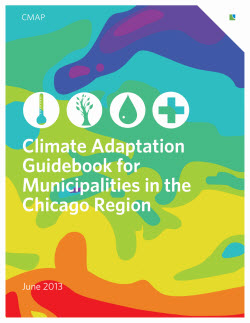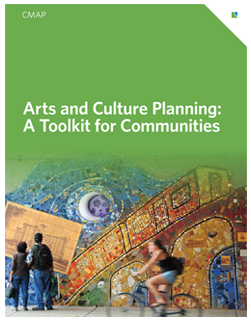CMAP is launching a new quarterly newsletter for metropolitan Chicago's 284 municipalities. This "e-blast" briefly highlights local planning resources that can help communities implement livability recommendations from the GO TO 2040 comprehensive regional plan. To learn more or request printed copies of the toolkits highlighted below, please contact Justine Reisinger (jreisinger@cmap.illinois.gov or 312-386-8802).
New local data profiles for 284 municipalities, seven counties in region
A new set of Community Data Snapshots from CMAP summarize demographics, housing, employment, transportation habits, retail sales, property values, and land use in metropolitan Chicago's 284 municipalities and seven counties. The snapshots reveal a lot about your community and neighboring ones in the region's seven counties. How does land use in Algonquin compare with Zion? How do residents of Blue Island, for example, travel to work? Is there much multi-family housing in Lockport? Each snapshot is presented in an easy-to-print PDF, and they are grouped both alphabetically and by county. Data comes from sources that include the U.S. Census Bureau, the Illinois Department of Employment Security, the Illinois Secretary of State, the Illinois Department of Revenue, and CMAP. This fall, snapshots will be released for the 77 Chicago Community Areas. We are interested in your feedback. Please contact Liz Panella (epanella@cmap.illinois.gov or 312-386-8839) with questions or comments.
Two toolkits help communities plan for climate change and the arts
CMAP's Local Ordinances and Toolkits program offers resources to help local officials put GO TO 2040 to work in their communities. In collaboration with municipal officials and other experts, CMAP is developing a series of guides, each of which describes the implementation of a specific municipal policy, from study to approval. These materials can also be used as the basis of local planning efforts through our Local Technical Assistance (LTA) program. CMAP's two latest resources focus on climate adaptation and arts and culture:
 Scientific consensus is that the global climate is changing and that greenhouse gas emissions are chiefly responsible. To help mitigate climate change, the GO TO 2040 comprehensive regional plan recommends important local steps such as improving energy efficiency and encouraging the use of low-carbon transportation alternatives that include walking, biking, and transit. While reducing emissions is critical to limit climate change, we would also be wise to prepare for its impacts -- it is much cheaper and less disruptive to plan now for anticipated conditions than to retrofit or rebuild later. CMAP's Climate Adaptation Guidebook for Municipalities in the Chicago Region helps communities increase their resilience to future weather impacts by adjusting their planning and investment decisions. Appendices to the guide include self-assessment and financing tools. To learn more, contact Jesse Elam (jelam@cmap.illinois.gov or 312-386-8688).
Scientific consensus is that the global climate is changing and that greenhouse gas emissions are chiefly responsible. To help mitigate climate change, the GO TO 2040 comprehensive regional plan recommends important local steps such as improving energy efficiency and encouraging the use of low-carbon transportation alternatives that include walking, biking, and transit. While reducing emissions is critical to limit climate change, we would also be wise to prepare for its impacts -- it is much cheaper and less disruptive to plan now for anticipated conditions than to retrofit or rebuild later. CMAP's Climate Adaptation Guidebook for Municipalities in the Chicago Region helps communities increase their resilience to future weather impacts by adjusting their planning and investment decisions. Appendices to the guide include self-assessment and financing tools. To learn more, contact Jesse Elam (jelam@cmap.illinois.gov or 312-386-8688).
 Arts and Culture Planning: A Toolkit for Communities can help local planners incorporate more arts and culture into their communities. The step-by-step guide includes model ordinance language that planners can customize for their own community to set goals, identify assets, and evaluate needs and impacts. For more information and assistance, please contact Stephen Ostrander (sostrander@cmap.illinois.gov or 312-386-8696).
Arts and Culture Planning: A Toolkit for Communities can help local planners incorporate more arts and culture into their communities. The step-by-step guide includes model ordinance language that planners can customize for their own community to set goals, identify assets, and evaluate needs and impacts. For more information and assistance, please contact Stephen Ostrander (sostrander@cmap.illinois.gov or 312-386-8696).
Ongoing update of Municipal Directory
Following the April elections and throughout the summer, CMAP has been gathering contact information to update our Municipal Directory, which was last published in August 2011. With general contact information for Mayors/Presidents, City/Village Clerks, and City/Village Managers/Administrators, the directory is posted to CMAP's Council of Mayors web page. Please review your municipality's information and confirm its accuracy with Sherry Kane (skane@cmap.illinois.gov). Communities may also provide contact information for public works directors, as well as staff from planning and community/economic development departments.